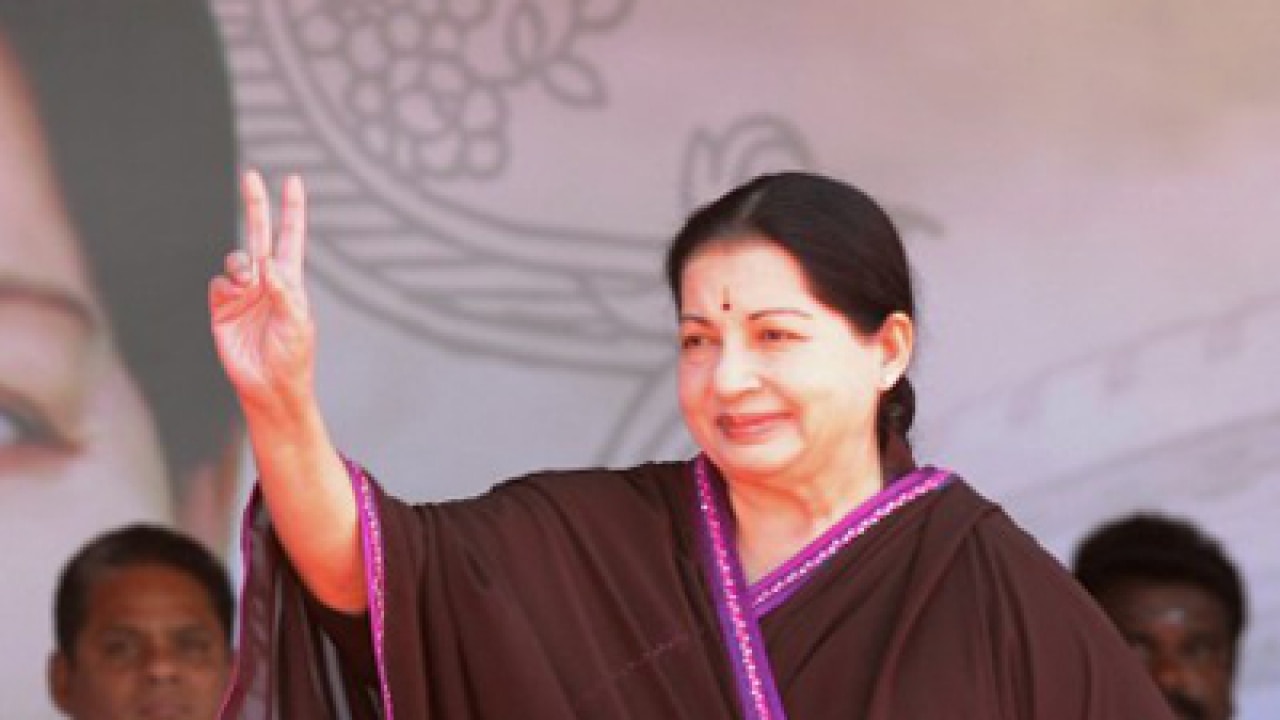Here's how j jayalalithaa's disproportionate assets case unfolded
- Select a language for the TTS:
- UK English Female
- UK English Male
- US English Female
- US English Male
- Australian Female
- Australian Male
- Language selected: (auto detect) - EN

Play all audios:

An acquittal would now enable a big political comeback for Jayalalithaa, who has waged many legal battles and seen several ups and downs in her political career. In a huge relief to former
Tamil Nadu chief minister, the Karnataka high court on Monday acquitted J Jayalalithaa in disproportionate assets case. An acquittal would now enable a big political comeback for
Jayalalithaa, who has waged many legal battles and seen several ups and downs in her political career. ALSO READ: JAYALALITHAA DISPROPORTIONATE ASSETS CASE: HOW IT ALL BEGAN TIMELINE 1996:
Dr Subramanian Swamy, then a leader of Janata Party, files a case against Jayalalithaa alleging that during her tenure as Chief Minister from 1991 to 1996, she amassed properties worth Rs
66.65 crore disproportionate to her known sources of income. 1996, DECEMBER 7: Jayalalitha arrested. Many allegations follow, including accumulation of disproportionate assets. 1997: A
prosecution launched in Additional Sessions Court in Chennai against Jayalalithaa and three others for having assets "disproportionate" to their known income. 1997, JUNE 4:
Charge-sheeted for offences under Sections 120-B IPC, 13(2) read with 13(1)(e) of the Prevention of Corruption Act, 1988. 1997, OCTOBER 1: Madras High Court dismisses three petitions by
Jayalalitha including one challenging sanction granted by then Governor M Fathima Beevi for prosecuting her in the wealth case. Trial progresses. By AUGUST 2000, 250 prosecution witnesses
examined, only 10 more remained. 2001: May Assembly elections, AIADMK secures absolute majority and Jayalalitha becomes Chief Minister. Her appointment is challenged due to her conviction in
October, 2000 in the TANSI (Tamil Nadu Small Industries Corporation) case. SC nullifies the appointment. 2001, SEPTEMBER 21: Jayalalithaa ceases to be Chief Minister. 2002, FEBRUARY 21:
After her conviction is set aside, Jayalalithaa is elected to the Assembly in a bypoll from Andipatti constituency and again sworn in as Chief Minister. Three public prosecutors resign as
also senior counsel. Several prosecution witnesses resile from their earlier depositions after AIADMK returned to power. 2003: DMK general secretary K Anbazhagan approaches Supreme Court for
transferring the trial to Karnataka on the ground that a fair trial was not possible in Tamil Nadu with Jayalalithaa as Chief Minister. 2003, NOVEMBER 18: The Supreme Court transfered the
case to Bangalore. 2005, FEBRUARY 19: Karnataka Government appoints B V Acharya, a former advocate general, as Special Public Prosecutor (SPP) to conduct the prosecution. 2011,
OCTOBER/NOVEMBER : Jayalalithaa deposes in the Special Court and answers 1,339 questions. 2012, AUGUST 12: Acharya expresses his inability to continue as SPP. Karnataka government accepts
his resignation in January, 2013 and discharges him from the case. 2013, FEBRUARY 2: Karnataka government appoints G Bhavani Singh as SPP. 2013, AUGUST 26: Karnataka government issues a
notification withdrawing the appointment of Bhavani Singh as SPP without assigning any reason and without consulting the Chief Justice of Karnataka High Court. 2013, SEPTEMBER 30: Supreme
Court quashes the notification withdrawing appointment of Bhavani Singh as SPP. 2013, DECEMBER 12: Special Court allows a plea by DMK general secretary K Anbazhagan and directs physical
production of valuables and other assets seized from Jayalalithaa in 1997 and deposited in an RBI treasury in Chennai. 2014, FEBRUARY 28: Special Court dismisses plea by SPP seeking a
direction to produce before it the seized silver articles belonging to her. Judge says the SPP had filed it only with the purpose of delaying the proceedings. 2014, MARCH 14/15: Special
Court imposes a cost of one-day salary on SPP Bhavani Singh for not resuming the final arguments citing ill-health. 2014, MARCH 18: Singh moves Karnataka High Court challenging the special
court order imposing cost. 2014, MARCH 21: HC rejects his petition saying the order of the special court imposing cost was right. 2014, AUGUST 28: Special Court reserves judgement for
September 20 and directs all the four accused, including Jayalalithaa, to appear before it on that date. 2014, SEPTEMBER 16: Special Court defers by a week to September 27 pronouncement of
its verdict. 2014, SEPTEMBER 27: Special Court convicts Jayalalithaa. 18 OCTOBER 2014: Jayalalithaa finally gets relief as Supreme Court grants bail. Jayalalithaa was released from jail
after 21 days. 18 OCTOBER 2014: The Special Court issued the order for release of J Jayalalithaa from jail in accordance with the Supreme Court order granting her bail in the
disproportionate assets case. 12 NOVEMBER 2014: Jayalalithaa is disqualified from contesting elections for ten years, the Tamil Nadu government said in a gazette notification. 8 DECEMBER
2014: Jayalalithaa filed a voluminous paperbook of her appeal in the Karnataka High Court in line with the Supreme Court order while granting her conditional bail in the disproportionate
assets case. 27 APRIL 2015: The Supreme Court held that Tamil Nadu government has no right to appoint advocate Bhawani Singh as special public prosecutor(SPP) to appear in Karnataka High
Court for J Jayalalithaa's disproportionate assets case. 15 APRIL 2015: The Supreme Court referred a plea seeking removal of a special public prosecutor in the disproportionate assets
case of former Tamil Nadu chief minister J Jayalalithaa to a larger bench of three judges, after a division bench gave differing opinions. The plea was filed by Dravida Munnetra Kazhagam
(DMK) leader K Anbazhagan. 17 APRIL 2015: The Supreme Court extended the bail granted to former Tamil Nadu Chief Minister J Jayalalithaa till the disposal of her appeal before the Karnataka
High Court in disproportionate assets case in which she has been sentenced to four years in jail. 11 MAY 2015 : Jayalalithaa acquitted by Karnataka High Court in the disproportionate assets
case against her. _(WITH AGENCY INPUTS)_